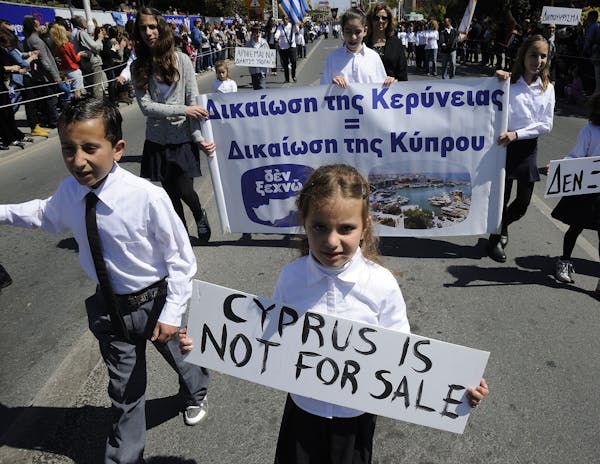The recent financial crisis in Cyprus has yet again raised questions not only about the ability of the 17 "eurozone" countries within the European Union to function as a monetary union, but also about whether they will ever achieve the stability of a fully functioning currency area.
Since the crisis in the eurozone countries' sovereign debt markets began in Greece in 2010, we have seen one country after another (Ireland, 2010; Portugal, 2011; Italy, almost, 2011; Spain, 2012, and now Cyprus) seeking bailouts to help them weather this financial storm, which was partially U.S.-induced (the subprime mortgage fiasco) and partially self-induced (living beyond one's means on cheap credit).
Are these the growing pangs of a new currency area, or the death pangs of a failed experiment in creating a true monetary union? To gain some appreciation of the eurozone's current condition, we need a historical context. So, what other group of independent political entities has ever tried such an experiment? While there have been a few attempts at monetary union in the past, there is one example that bears some resemblance to the eurozone — the "dollar zone" of the 13 former colonies of the fledgling United States.
As was the case at the creation of the euro currency and the eurozone on Jan. 1, 1999, the U.S. Constitution in 1789 gave Congress the right to mint coinage and to establish and regulate its value throughout the 13 states. However, as U.S. financial history reveals, the process of creating a monetary union took about 150 years, not a dozen. Indeed, the argument is sometimes made that the members of the eurozone are so different in their levels of economic development and in their monetary and fiscal discipline that the likelihood they will ultimately achieve monetary union and harvest its benefits is remote. One could have said the same about the 13 states back in 1800.
In fact, a national banking system was not established in the United States until 1863, and the Federal Reserve did not come about until 1913. There were still regional disagreements about monetary policy in the late 1920s and early 1930s. The paralysis these disagreements caused among politicians, bankers, labor and industry contributed to the onset of the Great Depression.
Indeed, it could be argued that our own dollar-zone monetary union might have collapsed in 1932-33 but was "saved" by a bank holiday, the calming pronouncements of the newly inaugurated President Franklin Roosevelt, and the Emergency Banking Act (1933), which created partial deposit insurance (the FDIC). The eurozone did have a cleaner start, with the euro currency being accepted in all member countries and the European Central Bank (ECB) being created on schedule in 1999.
The 13 states did not originally have a broadly accepted common currency (most using foreign specie and private bank paper currency), but they did have the same language; similar or common laws, rules and regulations, and, critically, labor mobility — if a factory or farm went bankrupt in one state, labor could easily move to another. This is not the case in the eurozone. If an employer goes out of business, that country's unemployment rate rises, with consequent demands on the public purse.
The recent eurozone crises have generated plenty of commentary and conflicting advice, but there seems to be a consensus that the currency will survive — it is going through growing pains, not death pangs. America's experience suggests several possible steps, in addition to the banking union agreed upon in December, that could help stabilize the eurozone: the creation of FDIC and bank resolution mechanism equivalents that could share bank bailout costs; more truly integrated capital markets, and possibly some oversight on capital's geographic "flight to safety" among E.U. members.
Coupled with such actions, there must be a realization that serious political commitments to the achievement of true economic union are critical if the markets are to have confidence that the E.U.'s institutional structures will be capable of handling any difficulties that occur on the rocky road to true monetary union. But get there they must — the consequences of failure are too dire to contemplate, for Europe, the United States and the rest of the world.
Roger Prestwich is professor of international business in the College of Management at Metropolitan State University.

The little park that could … be better
Climate change looms large this election year
For this Minnesota legislator, action targeting child abuse is intensely personal


